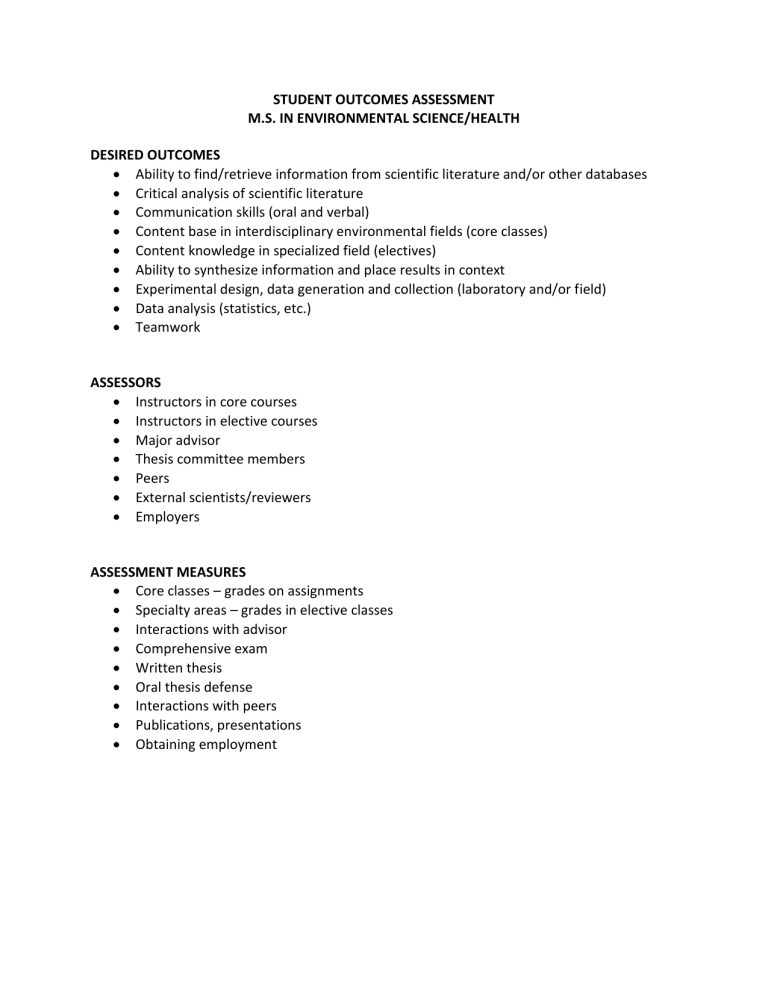STUDENT OUTCOMES ASSESSMENT M.S. IN ENVIRONMENTAL SCIENCE/HEALTH DESIRED OUTCOMES

STUDENT OUTCOMES ASSESSMENT
M.S. IN ENVIRONMENTAL SCIENCE/HEALTH
DESIRED OUTCOMES
Ability to find/retrieve information from scientific literature and/or other databases
Critical analysis of scientific literature
Communication skills (oral and verbal)
Content base in interdisciplinary environmental fields (core classes)
Content knowledge in specialized field (electives)
Ability to synthesize information and place results in context
Experimental design, data generation and collection (laboratory and/or field)
Data analysis (statistics, etc.)
Teamwork
ASSESSORS
Instructors in core courses
Instructors in elective courses
Major advisor
Thesis committee members
Peers
External scientists/reviewers
Employers
ASSESSMENT MEASURES
Core classes – grades on assignments
Specialty areas – grades in elective classes
Interactions with advisor
Comprehensive exam
Written thesis
Oral thesis defense
Interactions with peers
Publications, presentations
Obtaining employment
The mission of the M.S. program in Environmental Science and Health is to equip students to become scientists in the interdisciplinary environmental science fields through a background in coursework and the completion of a research-based thesis. The M.S. students in the
Environmental Science/Health Program are assessed throughout their graduate program. Early in the program (e.g. first two semesters), we expect students to obtain general knowledge and skills, while they refine these skills and focus on areas more specifically related to their thesis topics in the last year of study. Due in part to the interdisciplinary nature of this program, the degree to which students have achieved these outcomes is assessed by suite of measures and by a variety of people.
Student outcome assessment measures include:
1) Core classes – grades on assignments
The Environmental Programs curriculum includes several core courses (830:200 Environmental
Biology, 830:235 Topics in Environmental Chemistry and 830:250 Global Systems) that are taught by the program’s core faculty. Most of the graduate students take all three of these courses, and all take at least two. These classes include a variety of assignments that serve to measure the students’ mastery of some of the desired outcomes. For example, in
Environmental Biology students are asked to work as part of a team to read and discuss papers from the scientific literature, and to write a scientific review paper. The degree to which an individual student has mastered the outcomes is reflected in his/her grade for these assignments, and also in his/her grade for the course. The core faculty members also make informal assessments of the strengths and weaknesses of individual students as they work with them in class and during office hours.
2) Specialty areas – grades in elective classes
In addition to the required core classes, students also select electives from the graduate level courses offered in the College of Natural Sciences or other appropriate departments in consultation with the advisor and graduate committee. These courses can include a diversity of assignments, but would typically require students to write and/or give oral presentations, to learn specific content, and most likely to obtain information outside of the classroom and to work in teams.
3) Interactions with advisor
Graduate students work closely with their major advisors, often beginning prior to enrollment and continuing after graduation. As a result, advisors have many opportunities to monitor and assess their students’ progress throughout their graduate careers. Student progress towards the program goals and objectives is monitored, and advisors work individually with students to address any perceived weaknesses or deficiencies.
4) Comprehensive exam
In 2000/2001, the format of the comprehensive exam for Environmental Science/Health students was revised. Previously, the exam primarily assessed learning in core and elective courses, which is also assessed during these courses. The exam currently focuses on assessing
2
the ability of students to analyze scientific articles (one article intrinsic to their research area and one which is of a broader focus) and to synthesize their coursework. The exam is graded on a pass/fail basis, but the student also meets with the advisor to discuss the results of the exam and to receive specific feedback relating to strengths and weaknesses. This approach has been effective in assessing these higher level skills earlier in the student’s career (prior to the thesis defense).
5) Written thesis
Each M.S. student is required to write a thesis based on his/her original research. This thesis is read and assessed by the student’s advisor and graduate committee, who provide specific feedback on the student’s progress at various points during the process.
6) Oral thesis defense
Each student defends his/her thesis in a public presentation attended by students, faculty and interested members of the community. The public is allowed to question the student. The student and committee members then enter a private session in which the committee members can question the student on any aspect of his/her thesis and coursework and provide suggestions for revision of the thesis as necessary. The defense is graded on a pass/fail basis.
7) Interactions with peers
The M.S. students work together both in and out of class. The students all have access to one large research laboratory/office setting, and they often assist each other in data collection
(especially for field projects) and data analysis/presentation techniques (use of Excel, statistical tests, PowerPoint and poster presentations, etc.). The student cohort can then monitor and assess each other’s progress towards graduation. This peer assessment is documented in seminar and other courses, in which students are asked to make formal assessments of their colleagues.
8) Publications, presentations
Students are encouraged to prepare their research for publication in peer-reviewed journals and/or for presentation to the scientific community at local, regional and national meetings as the opportunity arises. In these instances, the student’s work is assessed by members of the scientific community.
9) Obtaining employment
Ultimately, most students seek employment or admission to Ph.D. programs after graduation.
At this point, their preparation is assessed by the external scientific community during the application and interview process.
Each of these outcome assessment measures can be used to assess more than one of the desired outcomes. Table 1 is a matrix demonstrating the relationship between outcomes and assessment measures. This information then becomes a part of the file for each individual student; the files are kept by the Environmental Programs director.
3
In addition to outcomes assessment during each student’s graduate career, we also keep track of the program alumni informally as well as through more formal communication, including the program newsletter. We find that this ongoing communication is effective in program evaluation because students are able to look back and see which experiences have prepared them for their current positions, as well as to point out any deficiencies in their coursework and/or training.
4

